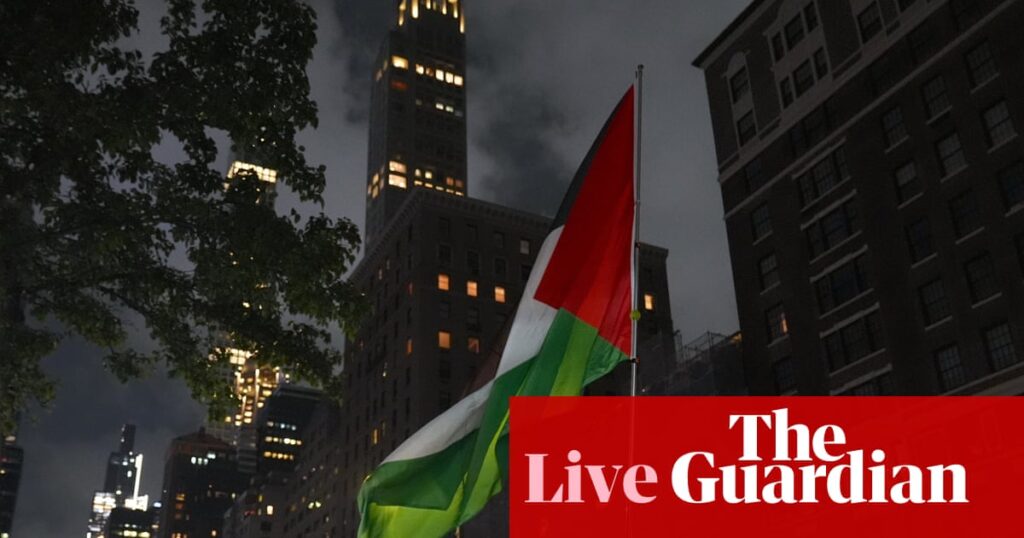Key events
Washington backing plan for Tony Blair to head transitional Gaza authority
Patrick Wintour
The White House is backing a plan that would see Tony Blair head a temporary administration of the Gaza Strip – initially without the direct involvement of the Palestinian Authority (PA), according to Israeli media reports.
Under the proposal, Blair would lead a body called the Gaza International Transitional Authority (Gita) that would have a mandate to be Gaza’s “supreme political and legal authority” for as long as five years.
According to reports in Haaretz and the Times of Israel, the plan is modelled on the administrations that initially oversaw Timor-Leste and Kosovo’s transitions to statehood. The proposal suggests that Gita could at first be based in el-Arish, an Egyptian provincial capital near Gaza’s southern border, and would eventually enter the territory accompanied by a UN-endorsed, largely Arab multinational force. The plan envisions “the eventual unifying of all the Palestinian territory under the PA”.
Under the plan, Palestinians would not be made to leave the territory, as had been feared would occur under previous US proposals to develop it as the “Gaza Riviera”.
If approved, Blair would head a secretariat of up to 25 people and chair a seven-person board to oversee an executive body running the territory.
But any role for the former Labour leader would inevitably prompt intense controversy. After stepping down as prime minister in 2007, he took on the role of Middle East envoy until 2015 and he enjoys a high standing with many Gulf leaders. But Blair is bitterly resented by many Palestinians – who see him as having impeded their efforts to attain statehood – and more broadly across the region for his role in backing the 2003 US invasion of Iraq.
Some western diplomats stressed it was by no means a done deal that Blair would run the interim Palestinian administration, and said it might be in place for only two years.
They added the Trump plan for the day after is linked to a ceasefire and full hostage deal.
News of the plan emerged just days after the UN general assembly endorsed a different plan for a technocratic administration to take charge in Gaza. Under that proposal, known as the New York declaration, the interim administration would operate for just one year, on the clear understanding that it would then hand power to a reformed PA with a revised constitution and after elections for a new president and parliament.
Trump says he ‘will not allow’ Israel to annex West Bank after lobbying from allies

Jason Burke
Donald Trump has said he will not allow Israel to annex the occupied West Bank, rejecting calls from some far-right politicians in Israel who want to extend sovereignty over the area and in doing so make impossible the establishment of a Palestinian state.
“I will not allow Israel to annex the West Bank. Nope, I will not allow it. It’s not going to happen,” Trump told reporters in the Oval Office, adding “There’s been enough. It’s time to stop now.”
Trump made the comments as Benjamin Netanyahu was arriving in New York to deliver an address to the United Nations on Friday.
There has been widespread speculation in Israel and elsewhere over how Netanyahu intends to retaliate for the recognition of Palestine as a state earlier this week by the UK, Australia, France, Canada and Portugal.
Officials in Jerusalem have said that anything Netanyahu does will be cleared first with Trump. Options include full annexation of the West Bank, or of smaller portions such as a strip of territory along the border with Jordan or shuttering British, French and other consulates in East Jerusalem, analysts said.
Earlier this week, British officials said they feared Trump would recognise Israeli control over illegal settlements on the West Bank in retaliation for the moves by the UK and others.
Netanyahu set for defiant UN speech as Trump warns on annexation of West Bank
Israeli prime minister Benjamin Netanyahu is expected to share a defiant message at the UN general assembly on Friday against a Palestinian state, but faces rare pressure from US president Donald Trump who seeks a deal on Gaza.
Netanyahu will address the UN days after France, the UK and several other western powers took the step of recognising a state of Palestine, acting out of exasperation over Israel’s relentless two-year offensive in Gaza.
The longest-serving prime minister in Israeli history has long rejected a Palestinian state and his far-right allies have mulled annexing the West Bank to kill any real prospect of an independent Palestine. But Trump, normally a staunch ally of Netanyahu, has warned against annexation as he pitches a peace plan on Gaza that would include the disarmament of Hamas.
“I will not allow Israel to annex the West Bank,” Trump told reporters at the White House. “No, I will not allow it. It’s not going to happen.”
Trump spoke on Thursday by telephone with Netanyahu, who is expected to head on Monday to Washington.
With Netanyahu facing an international criminal court arrest warrant over war crime allegations, including using starvation as a weapon, the Israeli prime minister took an unusual route to New York that included flying over the narrow strait of Gibraltar.
Steve Witkoff, Trump’s real-estate friend turned global negotiator, was seen entering the tightly guarded luxury hotel where Netanyahu was staying in Manhattan, reports Agence France-Presse (AFP). About 20 protesters and a similar number of Netanyahu supporters were spotted outside.
Activists have planned a march from Times Square on Friday that will call for Netanyahu’s arrest, to coincide with his speech. More on this in a moment, but first here are some other key developments:
-
The White House is backing a plan that would see Tony Blair head a temporary administration of the Gaza Strip – initially without the direct involvement of the Palestinian Authority (PA), according to Israeli media reports. Under the proposal, Blair would lead a body called the Gaza International Transitional Authority (Gita) that would have a mandate to be Gaza’s “supreme political and legal authority” for as long as five years.
-
Civilians in Gaza have sustained injuries of a type and on a scale more usually seen among professional soldiers involved in intense combat operations, research has found. A study published in the British Medical Journal (BMJ) found that some types of wounds – such as burns or injuries to legs – were more common among civilians in Gaza than among US soldiers fighting in recent conflicts in Iraq and Afghanistan.
-
The European Broadcasting Union has confirmed it will hold an online vote in November that could see the Israeli broadcaster Kan expelled from next year’s Eurovision song contest. In a letter sent to participating broadcasters on Thursday, the EBU president, Delphine Ernotte Cunci, wrote there was an “unprecedented diversity of views” on Israel’s participation in Eurovision, and the issue required “a broader democratic basis”.
-
Uefa could decide as early as next week whether to suspend Israel from its competitions, with the governing body facing growing pressure from inside and outside the game. Reports on Thursday, initially in the Times, suggested a vote that would determine Israel’s participation in World Cup qualifying and that of Maccabi Tel Aviv in the Europa League could be held by Uefa’s executive committee before the international break begins on 6 October.
-
A final Russian attempt to defer the snapback of large-scale UN sanctions on Iran is expected to fail at the UN security council on Friday after European countries rejected last-minute Iranian offers to give UN weapons inspectors limited access to its bombed nuclear sites.

